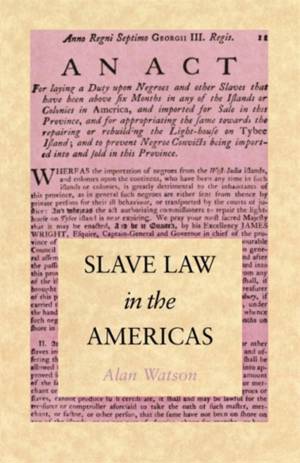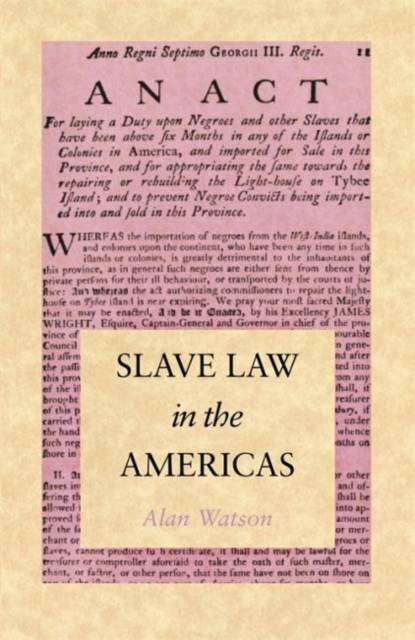
- Retrait gratuit dans votre magasin Club
- 7.000.000 titres dans notre catalogue
- Payer en toute sécurité
- Toujours un magasin près de chez vous
- Retrait gratuit dans votre magasin Club
- 7.000.0000 titres dans notre catalogue
- Payer en toute sécurité
- Toujours un magasin près de chez vous
Description
In this book, Alan Watson argues that the slave laws of North and South America--the written codes defining the relationship of masters to slaves--reflect not so much the culture and society of the various colonies but the legal traditions of England, Europe, and ancient Rome.
A pathbreaking study concerned as much with the nature of comparative law as the specific subject of the law of slavery, Slave Law in the Americas posits an essential distance in the Western legal tradition between the tenets of law and the values of the society they govern. Laws, Watson shows, often are made not by governments or rulers but by jurists as in ancient Rome, law professors as in medieval and continental Europe, and judges as in common law England. Bodies of law, often created without reference to particular social and political ideals, are also often transferred whole cloth from one society to another. Tracing the effects of the reception of Roman law throughout Europe (excluding England) and the Americas, Watson reveals the enormous impact of this legal tradition on subsequent lawmakers operating under utterly dissimilar social and political conditions in the New World. Slave law in the colonies, Watson demonstrates, had much to do with the mother country's relations to Roman law. Spain, Portugal, France, and the United Dutch Provinces, all within the Roman legal tradition, imposed on their colonies slave laws that were private and nonracist in character, laws that interfered little in master-slave relations and provided for the relative ease of manumission and the grant of citizenship to freed slaves. England, however, did not ascribe to Roman law and colonists created rather than received slave law. Public and racist, slave law in the English colonies uniquely reflected local concerns, involving every citizen in the protection and perpetuation of slavery, strictly regulating education, manumission, and citizenship status. "Comparative legal history," Watson writes, "is in its infancy." Presenting the laws of slavery in ancient Rome and in the slaveholding colonies of America, Watson demonstrates how comparative law can elucidate the relationship of law, legal rules, and institutions to the society in which they operate. Investigating not the dynamics of slavery but of slave law, he reveals the working of a legal culture and its peculiar history.Spécifications
Parties prenantes
- Auteur(s) :
- Editeur:
Contenu
- Nombre de pages :
- 200
- Langue:
- Anglais
Caractéristiques
- EAN:
- 9780820341170
- Date de parution :
- 01-11-12
- Format:
- Livre broché
- Format numérique:
- Trade paperback (VS)
- Dimensions :
- 152 mm x 229 mm
- Poids :
- 244 g

Les avis
Nous publions uniquement les avis qui respectent les conditions requises. Consultez nos conditions pour les avis.






